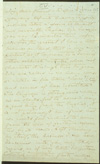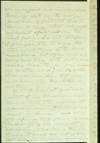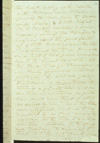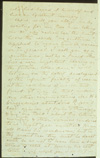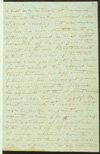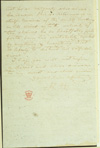Mahatma Letter No. 98: Difference between revisions
No edit summary |
Pablo Sender (talk | contribs) No edit summary |
||
| (13 intermediate revisions by 4 users not shown) | |||
| Line 1: | Line 1: | ||
{{Infobox MLbox | {{Infobox MLbox | ||
| header1 = People involved | | | header1 = People involved | | ||
| Line 12: | Line 7: | ||
| writtendate = unknown | | writtendate = unknown | ||
| receiveddate = December 1882 | | receiveddate = December 1882 | ||
| otherdate = | | otherdate = unknown | ||
| header3 = Places | | header3 = Places | ||
| sentfrom = unknown | | sentfrom = unknown | ||
| receivedat = [[Allahabad, India]] | | receivedat = [[Allahabad, India]] | ||
| vialocation = | | vialocation = unknown{{pad|9em}} | ||
}} | }} | ||
''' | This is '''Letter No. 98''' in '''[[The Mahatma Letters to A. P. Sinnett (book)|''The Mahatma Letters to A. P. Sinnett'']], 4th chronological edition'''. It corresponds to '''Letter No. 105''' in '''Barker numbering.''' See below for [[Mahatma Letter No. 98#Context and background|Context and background]]. | ||
<br> | <br> | ||
<br> | <br> | ||
| Line 34: | Line 29: | ||
My dear friend — | My dear friend — | ||
Before I give you any definite answer to your business letter I desire to consult our venerable Chohan. We have, as you say 12 months time before us. For the present I have a little business on hand, that is very important, as it hinges on to a series of other deliberate untruths, whose real character it is nigh time to prove. We are called in so many words, or rather in five letters "liars" (sic) and accused of "base ingratitude." The language is strong, and willing as we should feel to borrow many a good thing from the English, it is not politeness, I am afraid, that we would feel inclined to learn from the class of gentlemen represented by Mr. Hume. Left standing by itself, the business I am now concerned with, you may truly regard, as of very little importance collated with other facts, unless | Before I give you any definite answer to your business letter I desire to consult our venerable [[Chohan]]. We have, as you say 12 months time before us. For the present I have a little business on hand, that is very important, as it hinges on to a series of other deliberate untruths, whose real character it is nigh time to prove. We are called in so many words, or rather in five letters "liars" (sic) and accused of "base ingratitude." The language is strong, and willing as we should feel to borrow many a good thing from the English, it is not politeness, I am afraid, that we would feel inclined to learn from the class of gentlemen represented by [[Allan Octavian Hume|Mr. Hume]]. Left standing by itself, the business I am now concerned with, you may truly regard, as of very little importance collated with other facts, unless | ||
{{Col-break|width=3%}} | |||
{{Col-break|width=15%}} | {{Col-break|width=15%}} | ||
[ | [http://www.theosophy.wiki/mywiki/images/ML/98-1_7177.jpg http://www.theosophy.wiki/mywiki/images/ML/98-1_7177_thm.jpg] | ||
{{Col-break|width=30%}} | {{Col-break|width=30%}} | ||
'''NOTES:''' | '''NOTES:''' | ||
* | * '''"12 months time before us,"''' before the termination of Sinnett's services as Editor of [[The Pioneer (periodical)|The Pioneer]]. | ||
{{Col-end}} | {{Col-end}} | ||
| Line 51: | Line 49: | ||
shown on good and unimpeachable testimony as, to say the least, a perversion of facts — it tends to become a cause which will yield unpleasant effects and ruin the whole fabric. Do not, therefore, I pray you, stop to argue the utter unworthiness of the small remembrance, but relying upon our seeing something of the future which remains hidden to you, pray answer my question, as a friend and brother. When you have done that you will learn why this letter is written. | shown on good and unimpeachable testimony as, to say the least, a perversion of facts — it tends to become a cause which will yield unpleasant effects and ruin the whole fabric. Do not, therefore, I pray you, stop to argue the utter unworthiness of the small remembrance, but relying upon our seeing something of the future which remains hidden to you, pray answer my question, as a friend and brother. When you have done that you will learn why this letter is written. | ||
H.P.B. has just quarrelled with Djual Khool, who maintained that the unpleasant proceeding was not entered in the minutes by Davison, while she affirmed that it was. Of course he was right and she wrong. Yet if her memory failed her in this particular, it served her well as to the fact itself. You remember, of course | [[Helena Petrovna Blavatsky|H.P.B.]] has just quarrelled with [[Djual Khool]], who maintained that the unpleasant proceeding was not entered in the minutes by Davison, while she affirmed that it was. Of course he was right and she wrong. Yet if her memory failed her in this particular, it served her well as to the fact itself. You remember, of course | ||
{{Col-break|width=3%}} | |||
{{Col-break|width=15%}} | {{Col-break|width=15%}} | ||
[ | [http://www.theosophy.wiki/mywiki/images/ML/98-2_7178.jpg http://www.theosophy.wiki/mywiki/images/ML/98-2_7178_thm.jpg] | ||
{{Col-break|width=30%}} | {{Col-break|width=30%}} | ||
'''NOTES:''' | '''NOTES:''' | ||
* | * '''Davison''' refers to William Ruxton Davison, an ornithologist who served as a curator of Mr. Hume's personal bird collection, and probably as Mr. Hume's personal secretary. | ||
{{Col-end}} | {{Col-end}} | ||
| Line 66: | Line 68: | ||
{{Col-begin|width=98%}} | {{Col-begin|width=98%}} | ||
{{Col-break|width=55%}} | {{Col-break|width=55%}} | ||
the event. Meeting of the Eclectics in the Billiard room. Witnesses — yourself, the Hume pair, the Gordon couple, Davison and H.P.B. Subject: S. K. Chatterji his letter to Hume expressing contempt for theosophy and suspicious about the good faith of H.P.B. Handing over the letter I had returned her to Mr. Hume she said that I had given orders through her to the General Council to invite the Babu to resign. Thereupon Mr. Hume proclaimed most emphatically: "In such case your Koot Hoomi is no gentleman. The letter is a private letter and under these circumstances no gentleman would ever think of acting as desired by him." Now the letter was not a private one, since it was circulated by Mr. Hume among the members. At the time I paid no attention whatever to the fling. Nor had I come to know of it through H.P.B., but through G. Khool | the event. Meeting of the [[Simla Eclectic Theosophical Society|Eclectics]] in the Billiard room. Witnesses — yourself, the [[Allan Octavian Hume|Hume]] pair, the [[Lt. Col. W. Gordon|Gordon]] couple, [[William Ruxton Davison|Davison]] and [[Helena Petrovna Blavatsky|H.P.B.]] Subject: S. K. Chatterji his letter to Hume expressing contempt for [[theosophy]] and suspicious about the good faith of H.P.B. Handing over the letter I had returned her to Mr. Hume she said that I had given orders through her to the [[General Council of the Theosophical Society|General Council]] to invite the Babu to resign. Thereupon Mr. Hume proclaimed most emphatically: "In such case your [[Koot Hoomi]] is no gentleman. The letter is a private letter and under these circumstances no gentleman would ever think of acting as desired by him." Now the letter was not a private one, since it was circulated by Mr. Hume among the members. At the time I paid no attention whatever to the fling. Nor had I come to know of it through H.P.B., but through [[Djual Khool|G. Khool]] | ||
{{Col-break|width=3%}} | |||
{{Col-break|width=15%}} | {{Col-break|width=15%}} | ||
[ | [http://www.theosophy.wiki/mywiki/images/ML/98-3_7179.jpg http://www.theosophy.wiki/mywiki/images/ML/98-3_7179_thm.jpg] | ||
{{Col-break|width=30%}} | {{Col-break|width=30%}} | ||
'''NOTES:''' | '''NOTES:''' | ||
* | *'''S. K. Chatterji''' (or Chatterjee) was at a time President of the Lahore Branch. He eventually declared that the [[Theosophical Society|Society]] was "a huge imposture". | ||
{{Col-end}} | {{Col-end}} | ||
| Line 83: | Line 88: | ||
who had heard it himself and has an excellent memory. | who had heard it himself and has an excellent memory. | ||
Now, will you oblige me by writing for me two lines telling me as you remember the event. Were the words "no gentleman" applied to your humble servant or in general. I ask you as a gentleman, not as a friend. This has a very important bearing on the future. When done, I will let you see the latest development of the infinite "fertility of resource" at the command of our mutual friend. It may be, that under any other circumstances Mr. H.'s braggadocios about Lord Ripon's high opinion of Hume's theosophy and his "big talk" about his literary, monetary and other services rendered to us might pass unnoticed, for we all know his weaknesses; but in the present case they must be dealt with so as not to leave him a single straw to catch at, because his last letter to me (which you will see) — | Now, will you oblige me by writing for me two lines telling me as you remember the event. Were the words "no gentleman" applied to your humble servant or in general. I ask you as a gentleman, not as a friend. This has a very important bearing on the future. When done, I will let you see the latest development of the infinite "fertility of resource" at the command of our mutual friend. It may be, that under any other circumstances [[Allan Octavian Hume|Mr. H.]]'s braggadocios about Lord Ripon's high opinion of Hume's [[theosophy]] and his "big talk" about his literary, monetary and other services rendered to us might pass unnoticed, for we all know his weaknesses; but in the present case they must be dealt with so as not to leave him a single straw to catch at, because his last letter to me (which you will see) — | ||
{{Col-break|width=3%}} | |||
{{Col-break|width=15%}} | {{Col-break|width=15%}} | ||
[ | [http://www.theosophy.wiki/mywiki/images/ML/98-4_7180.jpg http://www.theosophy.wiki/mywiki/images/ML/98-4_7180_thm.jpg] | ||
{{Col-break|width=30%}} | {{Col-break|width=30%}} | ||
'''NOTES:''' | '''NOTES:''' | ||
* | *'''"Who had heard it himself."''' Evidently, Djual Khool was there in his subtle body, as he is not among those listed by the Mahatma as present. | ||
*'''Braggadocio''' is Italian for "boastful or arrogant behavior." | |||
*'''Lord Ripon''' (George Frederick Samuel Robinson, 1st Marquess of Ripon) was the British Viceroy of India from 1880-1884. | |||
{{Col-end}} | {{Col-end}} | ||
| Line 98: | Line 108: | ||
{{Col-begin|width=98%}} | {{Col-begin|width=98%}} | ||
{{Col-break|width=55%}} | {{Col-break|width=55%}} | ||
is not only entirely at variance with all the acknowledged rules of good breeding, but also because unless his own | is not only entirely at variance with all the acknowledged rules of good breeding, but also because unless his own misstatements are actually proved, he will boast hereafter of having given the direct lie to our [[Brotherhood of Adepts|Brotherhood]], and that no member of the latter could ever permit it. You cannot fail to remark the absurd contrast between his apparent confidence in his wonderful powers and superiority and the soreness he exhibits at the slightest remark passed upon him by myself. He must be made to realize that were he really as great as he asserts, or even if he were himself quite satisfied of his greatness and the infallibility of his power of memory, whatever even the [[adept]]s might think, he would remain indifferent to, at any rate, would | ||
{{Col-break|width=3%}} | |||
{{Col-break|width=15%}} | {{Col-break|width=15%}} | ||
[ | [http://www.theosophy.wiki/mywiki/images/ML/98-5_7181.jpg http://www.theosophy.wiki/mywiki/images/ML/98-5_7181_thm.jpg] | ||
{{Col-break|width=30%}} | {{Col-break|width=30%}} | ||
| Line 119: | Line 133: | ||
Yours ever affectionately, | Yours ever affectionately, | ||
K. H. | [[Koot Hoomi|K. H.]] | ||
{{Col-break|width=3%}} | |||
{{Col-break|width=15%}} | {{Col-break|width=15%}} | ||
[ | [http://www.theosophy.wiki/mywiki/images/ML/98-6_7182.jpg http://www.theosophy.wiki/mywiki/images/ML/98-6_7182_thm.jpg] | ||
{{Col-break|width=30%}} | {{Col-break|width=30%}} | ||
| Line 131: | Line 148: | ||
== Context and background == | == Context and background == | ||
This letter is in reply to a letter from Sinnett to the [[Koot Hoomi|Mahatma K.H.]] in which apparently he told the Mahatma about an event in his life which was to have great repercussions. | |||
After Sinnett published his first book, [[The Occult World (book)|''The Occult World'']], he earned the displeasure of the Anglo-Indian community and alienated the proprietors of [[The Pioneer (periodical)|The Pioneer]], of which he was editor. Then there came a change in management: an Englishman by the name of Rattigan purchased the newspaper. He was even less sympathetic with Sinnett and evuentually, in November of 1882, he was given notice of the termination of his services as editor of this important newspaper, although this was not to be effective for a year’s time. | |||
Presumably, he wrote the Mahatma K.H. about the development and he may have suggested the production of another newspaper to promote political freedom in India. So we have the inception of what has been called “The Phoenix Venture.” | |||
The unpleasant proceeding referred to in the second paragraph was a meeting of the [[Simla Eclectic Theosophical Society]], probably when [[H. P. Blavatsky]] and Sinnett were visiting the Humes there in 1881, to consider a letter from a man by the name of S.K. Chatterji. The letter was addressed to Hume and contained derogatory remarks about [[Theosophy]] and H.P.B. | |||
Apparently, Hume sent this letter to the Mahatma K.H. to read, and the latter returned it through H.P.B. In returning it to Hume, she said that the Mahatma had given orders "through her to the General Council" to invite Mr. Chatterji to resign. Hume was upset about the handling of what he regarded to be "a private letter." | |||
== Physical description of letter == | == Physical description of letter == | ||
The original is in the British Library, Folio 3. [[George Linton]] and [[Virginia Hanson]] described the letter in this way: | |||
<blockquote> | |||
KH script in black ink, on two sheets of white paper, one folded and the other unfolded.<ref>George E. Linton and Virginia Hanson, eds., ''Readers Guide to The Mahatma Letters to A. P. Sinnett'' (Adyar, Chennai, India: Theosophical Publishing House, 1972), 162.</ref> | |||
</blockquote> | |||
== Publication history == | == Publication history == | ||
| Line 143: | Line 173: | ||
== Notes == | == Notes == | ||
<references/> | <references/> | ||
[[Category:ML from Koot Hoomi]] | |||
[[Category:ML needs background]] | |||
[[Category:ML to A. P. Sinnett]] | |||
[[Category:ML with images]] | |||
[[Category:ML needs commentary]] | |||
Latest revision as of 18:11, 21 June 2021
| Quick Facts | |
|---|---|
| People involved | |
| Written by: | Koot Hoomi |
| Received by: | A. P. Sinnett |
| Sent via: | unknown |
| Dates | |
| Written on: | unknown |
| Received on: | December 1882 |
| Other dates: | unknown |
| Places | |
| Sent from: | unknown |
| Received at: | Allahabad, India |
| Via: | unknown |
This is Letter No. 98 in The Mahatma Letters to A. P. Sinnett, 4th chronological edition. It corresponds to Letter No. 105 in Barker numbering. See below for Context and background.
< Prev letter chrono
Next letter chrono >
< Prev letter Barker
Next letter Barker >
Page 1 transcription, image, and notes
|
My dear friend — Before I give you any definite answer to your business letter I desire to consult our venerable Chohan. We have, as you say 12 months time before us. For the present I have a little business on hand, that is very important, as it hinges on to a series of other deliberate untruths, whose real character it is nigh time to prove. We are called in so many words, or rather in five letters "liars" (sic) and accused of "base ingratitude." The language is strong, and willing as we should feel to borrow many a good thing from the English, it is not politeness, I am afraid, that we would feel inclined to learn from the class of gentlemen represented by Mr. Hume. Left standing by itself, the business I am now concerned with, you may truly regard, as of very little importance collated with other facts, unless |
|
NOTES:
|
Page 2
|
shown on good and unimpeachable testimony as, to say the least, a perversion of facts — it tends to become a cause which will yield unpleasant effects and ruin the whole fabric. Do not, therefore, I pray you, stop to argue the utter unworthiness of the small remembrance, but relying upon our seeing something of the future which remains hidden to you, pray answer my question, as a friend and brother. When you have done that you will learn why this letter is written. H.P.B. has just quarrelled with Djual Khool, who maintained that the unpleasant proceeding was not entered in the minutes by Davison, while she affirmed that it was. Of course he was right and she wrong. Yet if her memory failed her in this particular, it served her well as to the fact itself. You remember, of course |
|
NOTES:
|
Page 3
|
the event. Meeting of the Eclectics in the Billiard room. Witnesses — yourself, the Hume pair, the Gordon couple, Davison and H.P.B. Subject: S. K. Chatterji his letter to Hume expressing contempt for theosophy and suspicious about the good faith of H.P.B. Handing over the letter I had returned her to Mr. Hume she said that I had given orders through her to the General Council to invite the Babu to resign. Thereupon Mr. Hume proclaimed most emphatically: "In such case your Koot Hoomi is no gentleman. The letter is a private letter and under these circumstances no gentleman would ever think of acting as desired by him." Now the letter was not a private one, since it was circulated by Mr. Hume among the members. At the time I paid no attention whatever to the fling. Nor had I come to know of it through H.P.B., but through G. Khool |
NOTES:
|
Page 4
|
who had heard it himself and has an excellent memory. Now, will you oblige me by writing for me two lines telling me as you remember the event. Were the words "no gentleman" applied to your humble servant or in general. I ask you as a gentleman, not as a friend. This has a very important bearing on the future. When done, I will let you see the latest development of the infinite "fertility of resource" at the command of our mutual friend. It may be, that under any other circumstances Mr. H.'s braggadocios about Lord Ripon's high opinion of Hume's theosophy and his "big talk" about his literary, monetary and other services rendered to us might pass unnoticed, for we all know his weaknesses; but in the present case they must be dealt with so as not to leave him a single straw to catch at, because his last letter to me (which you will see) — |
|
NOTES:
|
Page 5
|
is not only entirely at variance with all the acknowledged rules of good breeding, but also because unless his own misstatements are actually proved, he will boast hereafter of having given the direct lie to our Brotherhood, and that no member of the latter could ever permit it. You cannot fail to remark the absurd contrast between his apparent confidence in his wonderful powers and superiority and the soreness he exhibits at the slightest remark passed upon him by myself. He must be made to realize that were he really as great as he asserts, or even if he were himself quite satisfied of his greatness and the infallibility of his power of memory, whatever even the adepts might think, he would remain indifferent to, at any rate, would |
|
NOTES: |
Page 6
|
not be as vulgarly abusive as he is now. His sensitiveness is in itself evidence of the doubts lurking in his mind as to the validity of the claims he so boastfully puts forth; hence his irritability, excited by anything and everything that is likely to disturb his self-delusions. I hope you will not refuse a direct and clear answer to my direct and clear question. Yours ever affectionately, |
|
NOTES: |
Context and background
This letter is in reply to a letter from Sinnett to the Mahatma K.H. in which apparently he told the Mahatma about an event in his life which was to have great repercussions.
After Sinnett published his first book, The Occult World, he earned the displeasure of the Anglo-Indian community and alienated the proprietors of The Pioneer, of which he was editor. Then there came a change in management: an Englishman by the name of Rattigan purchased the newspaper. He was even less sympathetic with Sinnett and evuentually, in November of 1882, he was given notice of the termination of his services as editor of this important newspaper, although this was not to be effective for a year’s time.
Presumably, he wrote the Mahatma K.H. about the development and he may have suggested the production of another newspaper to promote political freedom in India. So we have the inception of what has been called “The Phoenix Venture.”
The unpleasant proceeding referred to in the second paragraph was a meeting of the Simla Eclectic Theosophical Society, probably when H. P. Blavatsky and Sinnett were visiting the Humes there in 1881, to consider a letter from a man by the name of S.K. Chatterji. The letter was addressed to Hume and contained derogatory remarks about Theosophy and H.P.B.
Apparently, Hume sent this letter to the Mahatma K.H. to read, and the latter returned it through H.P.B. In returning it to Hume, she said that the Mahatma had given orders "through her to the General Council" to invite Mr. Chatterji to resign. Hume was upset about the handling of what he regarded to be "a private letter."
Physical description of letter
The original is in the British Library, Folio 3. George Linton and Virginia Hanson described the letter in this way:
KH script in black ink, on two sheets of white paper, one folded and the other unfolded.[1]
Publication history
Commentary about this letter
Notes
- ↑ George E. Linton and Virginia Hanson, eds., Readers Guide to The Mahatma Letters to A. P. Sinnett (Adyar, Chennai, India: Theosophical Publishing House, 1972), 162.
